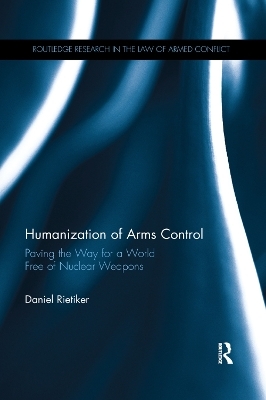
Humanization of Arms Control
Routledge (Verlag)
978-0-367-26701-8 (ISBN)
The book explores the preparatory work on arms control treaties and in particular the role of civil society. It analyzes the positive experiences of the movements against chemical weapons, anti-personnel mines, and cluster munitions, as well as the recent conclusion of the Arms Trade Treaty. The author examines the question of whether civil society will be able to replicate the success strategies that have been used, in particular, in the field of anti-personnel mines (Ottawa Convention) and cluster munitions (Oslo Convention) in the nuclear weapons field. Is there any reason why the most destructive weapons should not be outlawed by a legally binding instrument?
The book also explains the effects of weapons, especially nuclear weapons, on human beings, the environment, and global development, thereby focusing on vulnerable groups, such as indigenous peoples, women, and children. It takes a broad approach to human rights, including economic, social, and cultural rights. The author concludes that the use of nuclear weapons is illegal under international humanitarian and human rights law and, moreover, constitutes international crimes under the Rome Statute of the International Criminal Court.
In his general conclusions, the author makes concrete proposals for the progress toward a world without nuclear weapons.
Daniel Rietiker (PhD) is a senior lawyer at the European Court of Human Rights and teaches international law and human rights at Suffolk University Law School (Boston, MA) and Lausanne University (Switzerland).
Part I Humanization of Arms Control Treaties Dealing with Non-Nuclear Weapons 1. Introductory Remarks 2. The Preparatory History of the Relevant Treaties, and in particular the role played by civil society 3. The Contribution of the CWC, the Ottawa and Oslo Conventions and the ATT to the Protection of the Human Being 4. Implementation and Verification of the Treaties by Human Rights Actors and Institutions Part II. Humanization of Arms Control Treaties Dealing with Nuclear Weapons 5. Scope of Part 2 6. The Preparatory History of the Treaties, and in Particular the Role Played by Civil Society 7. The Legality of Nuclear Weapons in the Light of Humanitarian and Human Rights Law 8. Implementation and Verification of the Treaties by Human Rights Actors and Institutions General Conclusions and Proposals for Progress Towards a World without Nuclear Weapons
| Erscheinungsdatum | 28.03.2019 |
|---|---|
| Reihe/Serie | Routledge Research in the Law of Armed Conflict |
| Verlagsort | London |
| Sprache | englisch |
| Maße | 156 x 234 mm |
| Gewicht | 498 g |
| Themenwelt | Recht / Steuern ► EU / Internationales Recht |
| Recht / Steuern ► Öffentliches Recht ► Völkerrecht | |
| Sozialwissenschaften ► Politik / Verwaltung ► Staat / Verwaltung | |
| ISBN-10 | 0-367-26701-2 / 0367267012 |
| ISBN-13 | 978-0-367-26701-8 / 9780367267018 |
| Zustand | Neuware |
| Haben Sie eine Frage zum Produkt? |
aus dem Bereich


